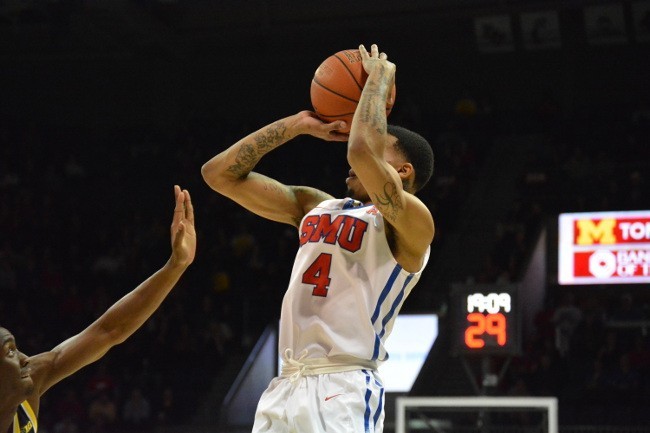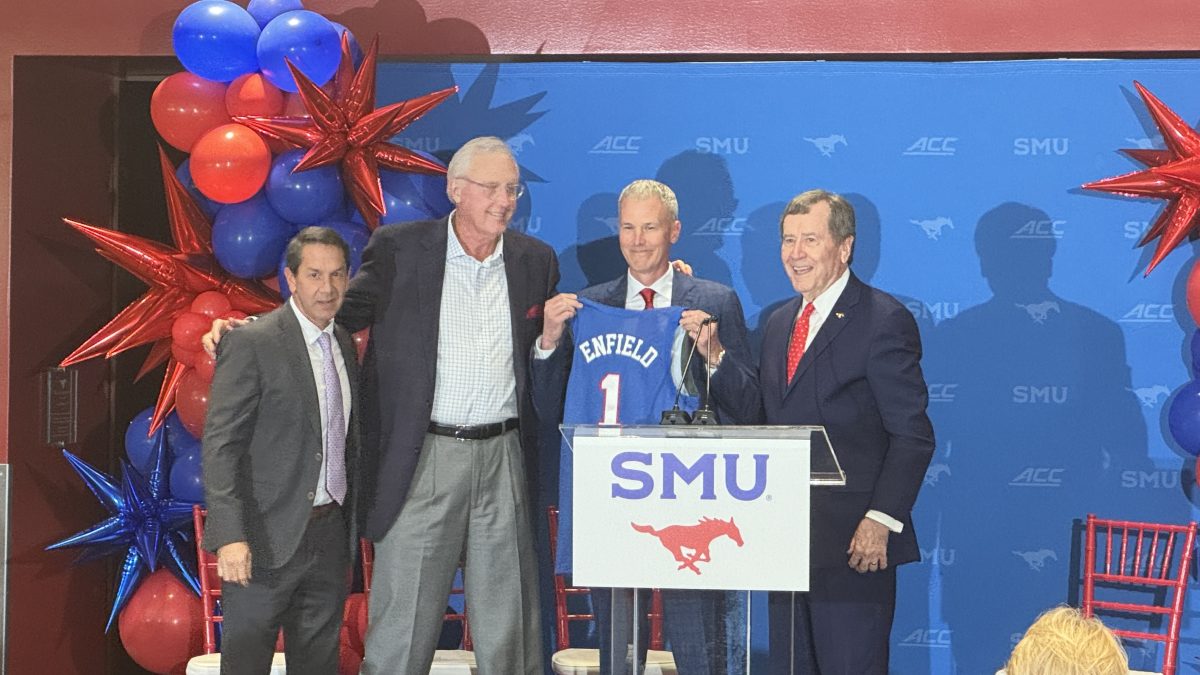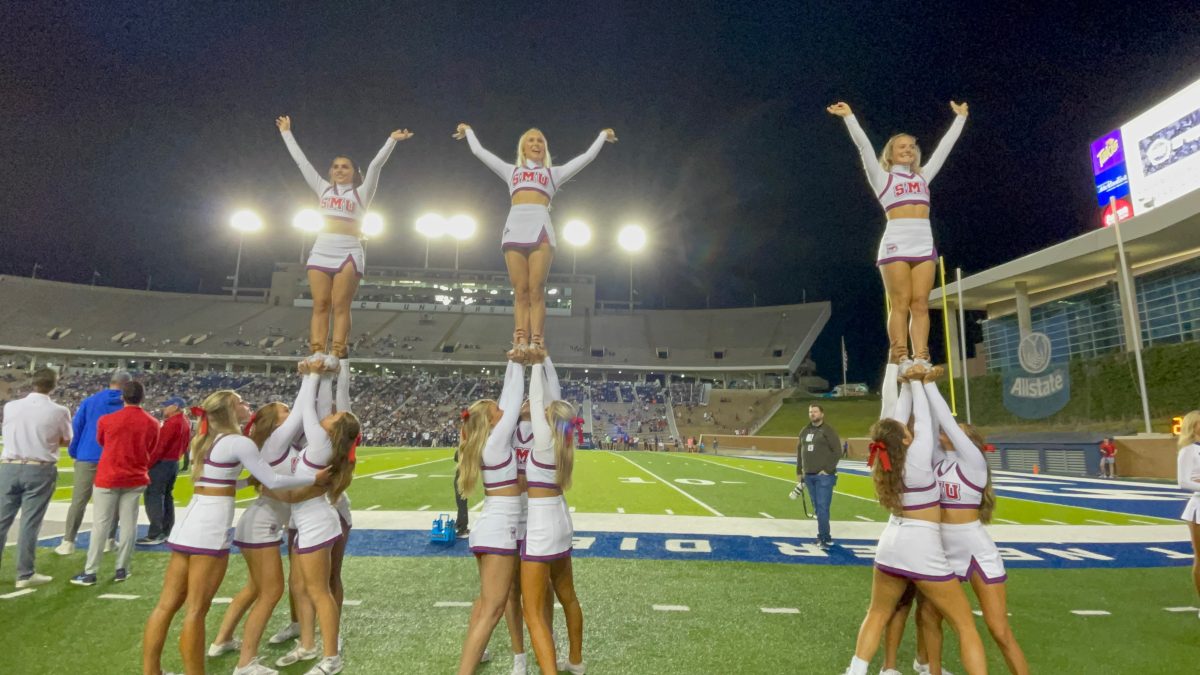
It’s April 2013, and SMU is coming off a 15-17 season in its first year under Larry Brown. Nic Moore and Markus Kennedy are in their transfer year and unknown to most, unable to play a minute for SMU due to NCAA transfer rules. Moody Coliseum had yet to be renovated, its wooden student section seats still splintering the few students who came to games.
A program in SMU’s spot often wants something to catch the locals’ eye and some kind of splash on the recruiting trail. Enter Keith Frazier, a top-35 player in the 2013 recruiting class, a two-time state champion, a McDonald’s All-American and one of the highest-rated players to come out of Dallas since 2010. The Kimball High School product presented a chance for SMU to check both those boxes.
There was one problem: Frazier was a well-known academic risk. Toward the end of his recruitment, only SMU and a Texas Tech program coming off three straight seasons with at least 19 losses were seriously pursuing him. In other words, programs with the most to gain and less to lose by taking the risk. SMU chose to take it.
SMU felt the benefits quickly. The Dallas area noticed when a top talent committed to a program that had been largely dormant since its last NCAA tournament appearance in 1993. The SMU community noticed and bought the hype. Chants of “Keeeith” rang at the American Airlines Center on Nov. 8, 2013, Frazier’s first career game. The chant followed him throughout his career every time he hoisted a three-pointer at Moody.
The Dallas basketball scene noticed. SMU had some new credibility among local AAU teams and high schools. Four months after Frazier signed with SMU, Prime Prep Academy (Texas) point guard Emmanuel Mudiay, a top-five player in the class of 2014 and another McDonald’s All-American, committed to SMU over blue blood Kentucky. The risk was paying off.
Then came the problems with Frazier. Inconsistent play. Forcing shots. He was ruled academically ineligible for the Spring 2015 semester. The NCAA sanctions given to SMU in September 2015 found that a former administrative assistant took a course for Frazier in the summer of 2013. As Scout.com’s Billy Embody reported Friday, Frazier has officially left SMU and will look to transfer, the latest and likely final development in his SMU career. On Jan. 5, CBS Sports and others reported that he was leaving the team, but head coach Larry Brown said he was still a “part of the SMU family” last week. Despite Brown’s comments, Frazier was all but done playing for SMU, but was not done at the university and was still listed on the roster. He has not played since the team’s Dec. 29 win over Tulsa, and missed multiple practices and meetings since his Dec. 22 return from a knee injury. Freshman Shake Milton took Frazier’s starting spot while he was out, furthering his unhappiness.
Frazier leaves SMU after two and a half years of uneven play and as a big reason for SMU’s NCAA troubles. After Frazier’s career, it’s difficult to see SMU’s risk as one that paid off. It’s fair to question if the recruiting credibility, attention and hype was worth all the trouble and inconsistency he brought. There are a few reasons that would make some say it was worth it. Frazier’s commitment helped dispel the notion that SMU won’t get the best athletes into school or won’t recruit players with shady handlers. Mudiay has less reason to commit to SMU without Frazier’s presence. After Mudiay’s commitment, SMU started offering and recruiting more big-name players from the Dallas area and beyond. Even though Mudiay never played a minute for SMU, he furthered the change in recruiting perception that Frazier had helped start.
But those benefits didn’t match the trouble that signing Frazier brought. The NCAA’s investigation revealed that Frazier didn’t need the course to be eligible. If SMU did proper research in advance, it could have avoided NCAA sanctions. Regardless of the necessity of the course, SMU still committed the academic fraud. Someone felt like fraud was necessary, showing how big a burden he was and the actions SMU was willing to take to keep him on the court. The ban brought a skeptical perception of SMU among college basketball fans and media. It refreshed SMU’s reputation as cheaters. Furthermore, the recruiting credibility Frazier’s signing brought hasn’t been worth as much as originally thought. SMU has signed good players without focusing exclusively on the Dallas area and has been active in the transfer market. Recruiting locally isn’t as big a necessity in basketball. SMU has not signed a Dallas-area high school player since Mudiay. With Frazier gone, Jordan Tolbert and an injured Ben Emelogu are the only DFW natives on the roster. They are also two of the five transfers on the roster. SMU has won 69 games since the start of the 2013-14 season, with Frazier as the only DFW high school player to sign and play in that span.
Frazier seemed to follow most of his promising games with a step back. Given the inconsistency, it’s hard to say he really made SMU better on the court. SMU started winning when Frazier was a freshman, but he was a substitute on a team led by Moore, Kennedy, Shawn Williams and Nick Russell. He played 14.8 minutes per game had 12 games without a made three-pointer.
When he was ineligible as a sophomore, SMU went 14-3 without him and won the American Conference regular season and conference titles. That’s not to say that he was hindering the team, but that the team didn’t really miss him.
This year, he has scored 23 points twice, shut down prolific Michigan guard Caris LeVert and posted a 19-point, 10-rebound game against Kent State. But he also produced a scoreless game at TCU (after one of the 23-point games) and combined for three field goals against Colorado and Tulsa (the two games following the double-double). That doesn’t sound like a player worth the damage he brought. A team that can win regularly on an inconsistent player’s off nights sounds like a team that didn’t need a big recruiting splash to garner attention and start winning.










